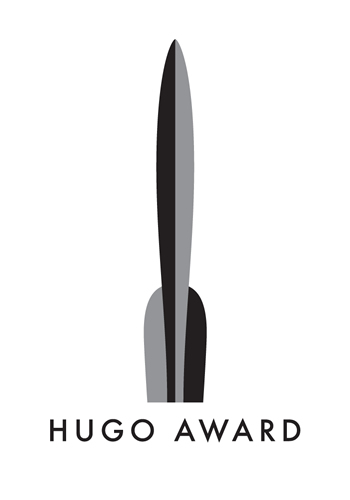 Today I’m making the leap from the literary categories, starting with what is essentially the television category. It’s interesting to me the way in which this category is systematically dominated by a particular geek show: Twenty years ago it was Babylon 5. Ten years ago it was Buffy. The Retro 1939 Hugo nominations are dominated by Mercury Theater broadcasts. And today it’s basically a loud huzzah for all things Doctor Who.
Today I’m making the leap from the literary categories, starting with what is essentially the television category. It’s interesting to me the way in which this category is systematically dominated by a particular geek show: Twenty years ago it was Babylon 5. Ten years ago it was Buffy. The Retro 1939 Hugo nominations are dominated by Mercury Theater broadcasts. And today it’s basically a loud huzzah for all things Doctor Who.
7. Doctor Who: “The Name of the Doctor”, written by Steven Moffatt, directed by Saul Metzstein.
I honestly don’t understand how this absolutely dreadful hour of television got nominated. Beyond the fan service, there’s absolutely nothing to like about this episode. Moffat rips himself off to create the Whisper Men. When faced with the fact that the entire hook of the episode was complete and utter nonsense, Moffat responded by making a Blu-Ray special in an effort to explain it (but actually just ended up contradicting the episode itself). The bulk of the episode serves mainly to remind us that the Great Intelligence was never actually established as a coherent villain during series 7 (and does nothing to grant him coherency now).
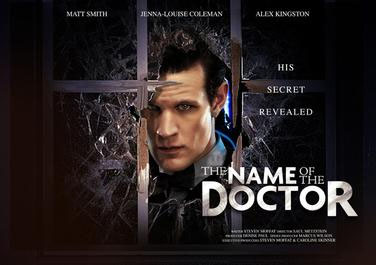 The end of the episode, of course, culminates in yet another “alternate universe created by an assassination attempt on the Doctor that threatens to destroy the universe, but is averted because… deus ex machina”. Which marks the third straight season finale in a row that Moffat used that plot. (Although, to be fair, the season 5 finale’s alternate universe created by an assassination attempt on the Doctor that threatened to destroy the universe did not require a deus ex machina in order to be averted.)
The end of the episode, of course, culminates in yet another “alternate universe created by an assassination attempt on the Doctor that threatens to destroy the universe, but is averted because… deus ex machina”. Which marks the third straight season finale in a row that Moffat used that plot. (Although, to be fair, the season 5 finale’s alternate universe created by an assassination attempt on the Doctor that threatened to destroy the universe did not require a deus ex machina in order to be averted.)
Bonus points to this episode, however, for hinging the deus ex machina on the stakes of Clara being totally dead if she jumps into the scar… and then just saying “fuck it” 30 seconds later and using another deus ex machina in order to save her. Extra bonus points for the deus ex machina used to save her having been established as being impossible, but then simply ignoring that with another deus ex machina. Moffat apparently can’t be satisfied until he’s got deus ex machina in his deus ex machina in his deus ex machina.
(The fact that it took two whole episodes before Moffat retconned this entire episode out of existence — with another deus ex machina, ‘natch — really makes the whole package extra impressive.)
To be fair, I suppose it can be said that “Name of the Doctor” is an admirable representation of just how utterly terrible the seventh series of Doctor Who was.
6. NO AWARD
5. The Five(ish) Doctors Reboot, written & directed by Peter Davison.
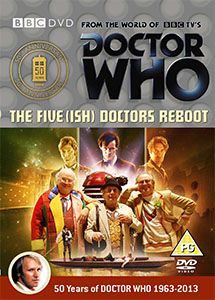 This is a remarkable tribute of love for Doctor Who and I was ecstatic to see its release as part of the 50th Anniversary festivities. If you’re a fan of Doctor Who and you haven’t seen it yet, please seek it out with the greatest possible alacrity.
This is a remarkable tribute of love for Doctor Who and I was ecstatic to see its release as part of the 50th Anniversary festivities. If you’re a fan of Doctor Who and you haven’t seen it yet, please seek it out with the greatest possible alacrity.
With that being said, this is not a piece which, IMO, transcends its immediate fandom. I’m not even sure it significantly transcends this particular moment in time. So while I’ve watched it multiple times myself and giggled with glee each time, I still think ranking it here is the right place for it.
4. An Adventure in Time and Space, written by Mark Gatiss, directed by Terry McDonough.
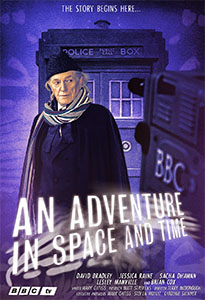 Quite possibly the best thing Mark Gatiss has ever written: An Adventure in Time and Space dramatizes the creation of Doctor Who and focuses a particularly fascinating lens on the life of William Hartness (as portrayed impeccably by David Bradley).
Quite possibly the best thing Mark Gatiss has ever written: An Adventure in Time and Space dramatizes the creation of Doctor Who and focuses a particularly fascinating lens on the life of William Hartness (as portrayed impeccably by David Bradley).
Its only real flaw, IMO, is the moment of gratuitous fan service which mars its finale. I’ve seen several historical dramas lately which have provided “happy” endings for their protagonists by suggesting that they had some sort of non-historical catharsis often featuring some sort of prescience that their legacy would endure. I find it vaguely cheap and rather disrespectful to the actual person.
I would be placing this 1-2 ranks higher if the ending was stronger, but don’t get me wrong: This is a nice little film. And if you’re a fan of Doctor Who then it’s a must-watch title.
3. Game of Thrones: “The Rains of Castamere”, written by David Benioff & D.B. Weiss, directed by David Nutter.
I’m actually not a huge fan of the Game of Thrones TV series.
I don’t hate it or anything (and the books are quite wonderful); I just haven’t gotten into it.
The Red Wedding, however, is such a memetically powerful event that the importance and effectiveness of this episode really can’t be questioned.
It is very award worthy.
2. Orphan Black: “Variations Under Domestication”, written by Will Pascoe, directed by John Fawcett.
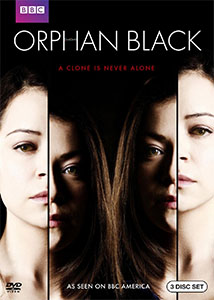 I really wish that Orphan Black was just a little bit more intelligent. The main characters all seem to have been hit over the head a few too many times with the idiot ball. (If you want to protect your daughter at all costs, why the fuck are you needlessly carrying her address with you when you decide to break into the bad guys’ home base? And what the fuck? You just got done saying that your apartment isn’t safe, why the fuck are you sending her there as if it were a safe house? … to cite just a couple of the show’s many, many examples.)
I really wish that Orphan Black was just a little bit more intelligent. The main characters all seem to have been hit over the head a few too many times with the idiot ball. (If you want to protect your daughter at all costs, why the fuck are you needlessly carrying her address with you when you decide to break into the bad guys’ home base? And what the fuck? You just got done saying that your apartment isn’t safe, why the fuck are you sending her there as if it were a safe house? … to cite just a couple of the show’s many, many examples.)
With that being said, Tatiana Maslany’s ability to just completely transform herself into different characters is simply unbelievable. (And it becomes even more unbelievable when she plays one of her characters pretending to be another of her character’s and somehow both characters simultaneously shine through.) And the series as a whole is totally addictive while just being one notch away from achieving true mind-blowing proportions (which is why I so desperately want it to be a little smarter). “Variations Under Domestication” is a particularly clever example of what the show is capable of achieving: Farcical techniques of mistaken identity are escalated in a beautiful spiral of comedy and drama.
1. Doctor Who: “The Day of the Doctor”, written by Steven Moffat, directed by Nick Hurran.
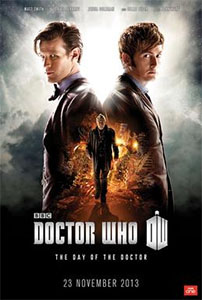 As absolutely dreadful as “The Name of the Doctor” and the rest Doctor Who‘s seventh series was, “The Day of the Doctor” was simply magnificent: Clever and compelling and endlessly fun, with healthy doses of fan service expertly deployed in order to improve the story rather than distract from it. It was a completely joyous reminder of the greatness that Moffat is capable of achieving as a writer. (Even if that only leaves you scratching your head when you consider the absolutely dreadful dreck it was surrounded by in “The Name of the Doctor” and “The Time of the Doctor”.)
As absolutely dreadful as “The Name of the Doctor” and the rest Doctor Who‘s seventh series was, “The Day of the Doctor” was simply magnificent: Clever and compelling and endlessly fun, with healthy doses of fan service expertly deployed in order to improve the story rather than distract from it. It was a completely joyous reminder of the greatness that Moffat is capable of achieving as a writer. (Even if that only leaves you scratching your head when you consider the absolutely dreadful dreck it was surrounded by in “The Name of the Doctor” and “The Time of the Doctor”.)
My only quibble with “The Day of the Doctor” is Moffat’s rather anemic understanding and portrayal of the Time War, but that’s not enough to detract from everything else that makes this my #1 pick for science fiction drama in the last year.













Never got into Dr. Who, never figured it out, but it seems an awful lot like a no rules, no theme, no referee improvised LRP we played in our school yard when I was ten. I watch the game of thrones and commend them for realism in acting, but it is a pale imitation of history to impress me. For instance, in history, in 1200’s, Mongols come to a town and upon a church offering sanctuary. They approach the local priest and offer him conversion to Islam. Priest says that he is a man of Christ. The leader of the Mongols proceeds to pour molten lead down the priest’s throat, and Mongols had the technique down to a routine. Two riders lay the priest down on his back, top of his head is covered in burlap sac cloth to protect it from the molten metal, then his bottom jaw is pulled open with a belt, and then the murder is done. The person does not die right away of course, this is not a modern day fantasy movie. The dying man still writhes on the ground, and the laughing Mongol leader asks the man to get up and speak to him, after all, if his God is real, shouldn’t there be a miracle? And what do we get in the Game of Thrones, some guy getting molten gold poured over his head and dying quicker and just as painlessly as from a lethal injection!
Way before LOTR, I read Sinkiewicz work of fiction, Teutonic Knights, and after that, The Ring of the Great Magister, again, Teutonic order trying to take the Baltics and converting Bavaria to Christianity by sword and flame. The biggest problem with modern fantasy genre is that authors write through the filter of our modern culture, and the experience of the Medieval, becomes a modern experience. It doesn’t have to be that way, but I have yet to find an author, who write fantasy without the modernity’s blinders and where elves are merely slender humans with pointy ears. At least that part I fixed in my D&D game.
@Brooser: Specific year and place name or it didn’t happen.
I was going to say there’s only ever one good show on at a time (thanks, Hollywood!) but we have GoT and Dr. Who now, so that’s not true. Huh.
@Mord: It didn’t happen circa February 7, 1239 when Batu Khan’s raiders of the Jochi Ulus horde were burning the city of Vladimir after it fell in what is now Russia.